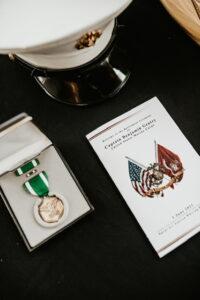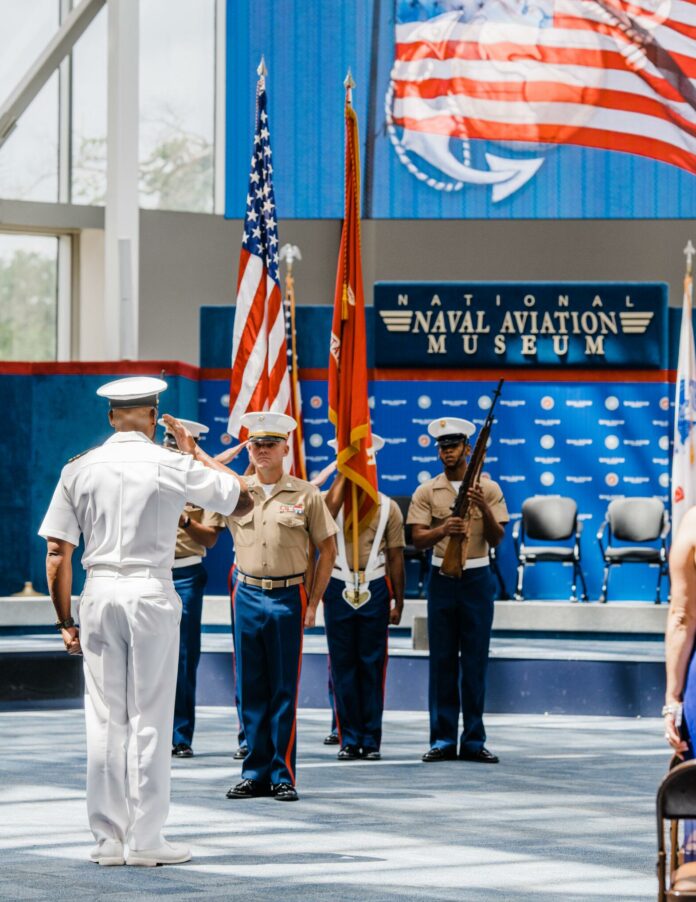Hello, everyone. I’m Connie, and today I’m opening up about a chapter in our lives that has been as challenging as it has been transformative. For 22 years, my husband Ben wore the Marine Corps uniform with honor and dedication. Now, as we navigate our lives beyond that uniform, we’ve encountered unexpected challenges that have profoundly altered our existence.
Many of you might recall the dramatic changes brought on by COVID-19 in 2020. Stuck at home, I told my husband, “I’ll never be the same again.” The time we spent together was precious and intensified our anticipation for his retirement after 22 long years of service. We dreamed of creating stability for our family, a stark contrast to the constant relocations of military life. Typically, transitioning service members attend a class that helps them adjust to civilian life. But due to the pandemic, we were thrust into a six-hour online session that left us more overwhelmed than informed. Scribbling notes frantically, I remember looking at Ben in disbelief and murmuring, “They can’t be serious. How are we supposed to absorb all this?”

When retirement finally arrived, we were elated but found ourselves clueless about what came next, prompting us to return to our beloved Alabama. We chose to settle down first, thinking employment would follow easily—how challenging could it be for a veteran with a master’s degree in business? Unfortunately, the reality was harsher than expected. Months of job applications led nowhere. Ben’s military skills, precise and respected within the forces, seemed to vanish in our small civilian town. Each job rejection felt like a personal affront, denying the value of his two decades of skilled service. It’s a cruel reality that many veterans encounter: their invaluable military skills often go unrecognized, leaving them feeling undervalued in the civilian workforce.
Two years into a job he despises, Ben has been tirelessly searching for something better. However, each rejection only erodes his self-worth further, a sentiment many of you might resonate with. The job market, seemingly oblivious to the value of military discipline and loyalty, has left us bewildered.
Yet, the most profound struggle has been with Ben’s mental health. As a proud Marine, he was conditioned to face challenges head-on. But nothing prepared him for the internal battles that would ensue once the structured support and camaraderie of military life ended. Therapy has become an essential part of his routine, a testament to his strength rather than a weakness. However, it’s a battle he wages daily, grappling with a lost sense of identity and diminished self-worth as the rejection emails accumulate. Hearing him say, “I don’t think I can do it anymore,” was heartbreakingly real and personal. Tragically, his ordeal reflects the silent battles many other veterans fight against depression and suicide—a grim reminder of the mental health crisis many endure after their service concludes.
The silence around these transitions is what strikes me most. There’s an unspoken expectation that once the uniform comes off, soldiers are ready to seamlessly integrate into civilian life. But how? The military trains you for combat, not for the emotional and psychological battles that follow. The support structures, the sense of purpose, everything changes, and not enough is done to prepare service members and their families for this new chapter.
It has become clear that a structured mentoring program could be invaluable in these transitions. Imagine the impact if each service member had a mentor to guide them through healthcare decisions, career paths, and the daily challenges of civilian life. Such support could significantly smooth their post-military journey, providing a sense of continued belonging and support.
Despite these challenges, there have been moments of deep gratitude. We call our home “the house that built us,” forged from our collective dreams and the stark realities of post-military life. The highest inflation in 40 years strained our finances during construction, but it brought us closer rather than driving us apart. This financial pressure hit us at a time when we thought we would finally have the freedom to make our own choices, something we longed for after decades of military life dictating our decisions. Yet, as we faced these harsh economic realities, it felt as though our choices were still being made for us, not by the military this time, but by circumstances beyond our control. Despite this, we’ve learned to cherish what we have, recognizing that the true foundation of our home is not just the physical structure, but the life and love we build within it.
 As Ben and I stumble, learn, and grow through this new phase of life, I share our story hoping to connect with others who feel just as adrift in the civilian world as we do. Let’s discuss these challenges, not as failings, but as battles needing strategies, support, and acknowledgment. Every soldier who sheds the uniform starts a new journey—let’s ensure they don’t walk it alone.
As Ben and I stumble, learn, and grow through this new phase of life, I share our story hoping to connect with others who feel just as adrift in the civilian world as we do. Let’s discuss these challenges, not as failings, but as battles needing strategies, support, and acknowledgment. Every soldier who sheds the uniform starts a new journey—let’s ensure they don’t walk it alone.
Here at the Military Mom Collective, we’re not just about sharing tips for better marriages or parenting hacks; we’re about sharing real, raw stories of transition from military to civilian life.
We’d love to hear your stories of retirement—the good, the bad, and the ugly. Through sharing, we might begin to carve a better path for those who follow. Let’s start this conversation and support each other beyond the uniform.
Always Inspired,
Connie Gene











